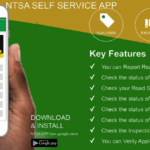The National Transport and Safety Authority (NTSA) is the heartbeat of Kenya’s road transport system, ensuring safety, compliance, and efficiency for millions of commuters, drivers, and transport operators. From Nairobi’s chaotic matatu routes to the bustling highways of Mombasa, NTSA’s mandate shapes how Kenyans move. Established under the National Transport and Safety Authority Act No. 33 of 2012, NTSA oversees critical functions like motor vehicle registration, driver licensing, public service vehicle (PSV) regulation, and road safety campaigns. With over 5 million vehicles registered and smart driving licences rolled out since 2017, NTSA’s role is pivotal in a country where road transport accounts for 90% of passenger and freight movement. This article dives into NTSA’s core functions, offering commuters, transport operators, and policymakers a clear, actionable guide to understanding and engaging with the authority.
NTSA’s Mandate: Steering Kenya’s Road Transport Sector
NTSA was created to bring order, safety, and efficiency to Kenya’s roads. Its mandate, as outlined in Act No. 33 of 2012, is both broad and specific, addressing everything from policy advice to hands-on regulation. Here’s a snapshot of NTSA’s core responsibilities:
- Policy Recommendations: Advise the government on road transport policies to enhance safety and efficiency.
- Policy Implementation: Execute policies to regulate the transport sector effectively.
- Sector Management: Plan and manage the road transport ecosystem, ensuring compliance with legal frameworks.
- Safe and Reliable Services: Promote safe, reliable, and efficient road transport for all Kenyans.
This mandate positions NTSA as a linchpin in Kenya’s transport ecosystem, balancing the needs of commuters, PSV operators, and policymakers while tackling challenges like road accidents, which claim over 4,000 lives annually, according to 2024 NTSA reports.
Core Functions of NTSA: Driving Safety and Compliance
NTSA’s core functions are the backbone of its operations, guiding its service delivery to millions of Kenyans. Below, we break down each function, highlighting its impact and how it serves commuters, operators, and policymakers.
1. Registration and Licensing of Motor Vehicles
Motor vehicle registration is a cornerstone of NTSA’s work, ensuring every vehicle on Kenyan roads is documented, roadworthy, and traceable. With over 5.2 million vehicles registered by 2024, this function supports tax compliance, road safety, and crime prevention.
- Process: Owners register vehicles via the NTSA TIMS portal (serviceportal.ntsa.go.ke) or at NTSA offices, submitting documents like import papers, bills of sale, and inspection reports. Fees, ranging from KSh 3,000 to KSh 15,000, are paid via M-Pesa or eCitizen.
- Key Services:
- New vehicle registration for cars, motorcycles, and commercial vehicles.
- Change of ownership for used vehicle transfers.
- Issuance of reflective number plates, mandatory since 2017.
- Impact: Registration ensures vehicles meet safety standards and are traceable in case of theft or accidents. It also generates revenue for road infrastructure, with NTSA collecting over KSh 10 billion annually.
For Commuters and Operators: Always verify your vehicle’s registration status on the TIMS portal to avoid penalties. Use SMS (send NT [Reg Number] to 22846) to check logbook or number plate status.
2. Motor Vehicle Inspections and Certification
Vehicle inspections ensure cars, matatus, and trucks are roadworthy, reducing accidents caused by mechanical failures. NTSA operates 27 inspection centers nationwide, including Likoni, Machakos, and Eldoret.
- Process: Vehicles undergo annual or pre-registration inspections, checking brakes, tires, lights, and emissions. Book via the TIMS portal or visit centers like Nyayo House in Nairobi.
- Challenges: X posts highlight long queues and delays, especially for PSVs. Some operators report waits of up to 6 hours at busy centers.
- Solutions: Book appointments online to skip queues. Email mvenquiries@ntsa.go.ke for inspection-related issues.
For Policymakers: Investing in more inspection centers could reduce delays, as current capacity struggles with Kenya’s growing vehicle population.
3. Regulation of Public Service Vehicles (PSVs)
PSVs, including matatus, buses, and taxis, are the lifeblood of Kenya’s public transport, serving over 70% of commuters. NTSA regulates PSVs to ensure safety, compliance, and fair competition.
- Key Regulations:
- PSV drivers and conductors must hold valid badges, issued after training and vetting.
- Vehicles require Road Service Licences (RSL) or Transport Service Licences (TSL), renewed annually.
- Saccos and transport companies must register with NTSA and adhere to safety protocols.
- Impact: Regulation has reduced PSV-related accidents by 15% since 2015, per NTSA data, but reckless driving remains a challenge, as seen in recent Eldoret-Nakuru highway crashes.
- Contact: Email mvenquiries@ntsa.go.ke or send SACCO [Sacco Name] to 22846 for status checks.
For Operators: Ensure your PSV badge and RSL are valid to avoid fines. Attend NTSA’s Jukwaa la Usalama forums for compliance updates.
4. Advising on National Road Transport Policy
NTSA advises the Ministry of Transport on policies to improve road safety and efficiency. This includes recommendations on speed limits, vehicle standards, and infrastructure upgrades.
- Recent Contributions: NTSA’s 2024 proposal for mandatory speed governors on all commercial vehicles was adopted, reducing high-speed crashes by 10%.
- Engagement: Policymakers can submit feedback via info@ntsa.go.ke or attend NTSA’s stakeholder forums.
For Policymakers: Collaborate with NTSA to develop data-driven policies, leveraging the authority’s annual road safety reports.
5. Developing and Implementing Road Safety Strategies
Road safety is NTSA’s flagship function, addressing Kenya’s high accident rate—4,000 fatalities annually, per 2024 data. Strategies include speed governor enforcement, drunk-driving crackdowns, and pedestrian safety campaigns.
- Initiatives:
- “Usalama Barabarani” campaign, educating drivers on safe practices.
- Installation of over 1,000 speed governors in PSVs since 2023.
- Partnerships with county governments for road safety signage.
- Impact: Fatalities dropped by 8% between 2022 and 2024, but motorcycle accidents remain a concern, with 1,200 deaths in 2024 alone.
For Commuters: Report unsafe driving via the NTSA app or call 0709 932 300 to support enforcement.
6. Public Education on Road Safety
NTSA’s road safety campaigns, like “Usalama Barabarani,” target drivers, pedestrians, and schoolchildren. These programs use media, workshops, and school outreach to promote safe road use.
- Examples:
- Workshops for boda boda riders in Kisumu and Mombasa.
- School programs teaching children to cross roads safely.
- Social media campaigns on X, reaching over 500,000 users monthly.
- Contact: Email info@ntsa.go.ke to request community outreach programs.
For Commuters: Follow NTSA’s X account (@NTSA_KE) for real-time safety tips and updates.
7. Conducting Research and Audits on Road Safety
NTSA conducts research to identify accident causes and develop solutions. Its annual road safety audits analyze crash data, road conditions, and driver behavior.
- Key Findings (2024):
- 60% of accidents occur at night due to poor lighting and speeding.
- 30% of crashes involve motorcycles, highlighting the need for rider training.
- Impact: Research informs policies like mandatory helmet use and nighttime speed limits.
For Policymakers: Access NTSA’s research reports on www.ntsa.go.ke to guide infrastructure investments.
8. Compiling Traffic Accident Reports
NTSA compiles detailed reports on traffic accidents, aiding investigations and policy formulation. These reports include crash locations, causes, and victim details.
- Process: Police and NTSA collaborate to document accidents, with data uploaded to NTSA’s database.
- Access: Request reports via info@ntsa.go.ke for legal or research purposes.
For Operators: Use accident data to train drivers and reduce fleet risks.
9. Training, Testing, and Licensing of Drivers
NTSA oversees driver training and licensing to ensure competent, safe drivers. The shift to smart driving licences has modernized the process, though delays persist.
- Process:
- Provisional Driving Licence (PDL): Apply via eCitizen, pay KSh 750.
- Driver Testing: Book tests at centers like Nyayo House or Thika via TIMS.
- Smart DL Issuance: Over 2 million smart DLs issued by 2024, but 570,000 remain uncollected.
- Contact: Email diqueries@ntsa.go.ke or send DL [ID Number] to 22846 for status checks.
For Commuters: Check your DL status regularly to avoid penalties for expired interim licences.
10. Formulating and Reviewing Driving School Curricula
NTSA standardizes driving school curricula to ensure quality training. It also licenses instructors and audits schools for compliance.
- Key Requirements:
- Schools must use NTSA-approved curricula, updated in 2023.
- Instructors need NTSA certification, renewed every 3 years.
- Contact: Email dsmqueries@ntsa.go.ke for registration or revalidation support.
For Operators: Ensure your driving school complies with NTSA standards to avoid closure during inspections.
11. Coordinating Road Safety Stakeholders
NTSA collaborates with police, county governments, and NGOs to promote road safety. This includes joint patrols, signage projects, and awareness campaigns.
- Examples:
- Partnerships with Red Cross for first-aid training at accident hotspots.
- Collaboration with Nairobi County for pedestrian walkways.
- Contact: Reach out via info@ntsa.go.ke to propose partnerships.
For Policymakers: Engage NTSA in county-level road safety projects to maximize impact.
Challenges and Solutions in NTSA’s Operations
Despite its achievements, NTSA faces challenges that frustrate users, as seen in X posts about delayed smart DLs and crowded inspection centers. Here’s how to navigate them:
- Delayed Smart DLs: Over 570,000 licences remain unprinted. Check status via SMS (DL [ID Number] to 22846) and follow up at diqueries@ntsa.go.ke.
- Inspection Delays: Book appointments online to avoid long queues. Email mvenquiries@ntsa.go.ke for issues.
- TIMS Portal Glitches: Clear browser cache or use the NTSA app. Contact 0709 932 300 for technical support.
- Unresponsive Contacts: Call customer care (0709 932 000) early in the morning or use email for faster responses.
Pro Tip: Use the NTSA mobile app for real-time updates on services, reducing reliance on busy phone lines.
Why NTSA’s Functions Matter to You
For commuters, NTSA’s vehicle inspections and driver licensing ensure safer roads, while its PSV regulations protect passengers from rogue operators. Transport operators benefit from clear licensing and Sacco guidelines, which streamline compliance and reduce fines. Policymakers rely on NTSA’s research and policy advice to build safer, more efficient transport systems. By understanding these functions, you can engage with NTSA more effectively, whether you’re renewing a DL, registering a matatu, or advocating for better roads.
NTSA’s core functions—from vehicle registration to road safety education—are the foundation of Kenya’s transport system. By regulating PSVs, licensing drivers, and advising on policies, NTSA ensures safer, more reliable roads for all. Despite challenges like delays and technical glitches, its digital platforms (TIMS, eCitizen, NTSA app) and contact channels (0709 932 300, info@ntsa.go.ke) make services accessible. For commuters, operators, and policymakers, staying informed about NTSA’s functions empowers you to navigate the system with confidence. Visit www.ntsa.go.ke or follow @NTSA_KE on X for the latest updates, and keep this guide handy for all your transport needs in 2025.





